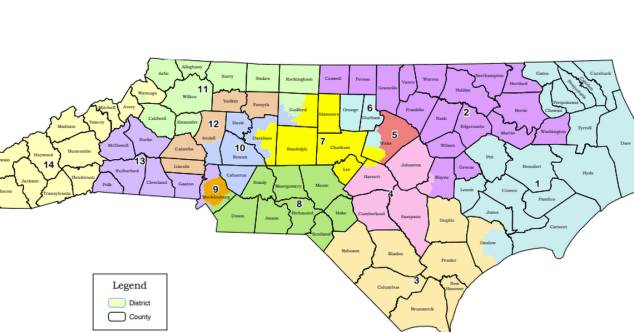
With the newly redrawn voting maps, Hyde County will be in three new voting districts next year unless a court orders them to be redrawn.
Throughout the country, every state is redrawing political maps based on new data from the 2020 census. North Carolina ratified new districts on Nov. 4. The new districts for Hyde County, which includes Ocracoke, are two for the state legislature and one for the federal congressional seat.
These new districts will be effective Jan. 1 unless lawsuits filed by Common Cause North Carolina, the NAACP and some other private citizens to put a halt to their implementation are successful. Two other lawsuits challenging the maps on racial and partisan gerrymandering also have been filed.
The ramifications of redistricting cannot be overestimated. It affects who gets to represent constituents and which political parties control state legislatures. Unless courts halt the process, will stay in effect until the next census in 2030.
While these changes apply to all of Hyde County.
Ocracoke, currently in state House District 6, next year will move into House District 79. The newly drawn district groups Hyde County with mostly noncoastal counties of Beaufort and Pamlico and a portion of Dare County up to the Harris Teeter grocery store in Kill Devil Hills. The current representative in this new district is Keith Kidwell (R-Beaufort County), who lives in Chocowinity at the western end of the district.
Next year House District 6 will consist of most of Craven County.
As for its state senate district, Ocracoke will move from District 1 to District 2 — separated completely from the northeastern coastal counties of Dare and Currituck and will be grouped with Carteret, Chowan, Halifax, Martin, Pamlico, Warren and Washington counties.
Federal Congressional lines are also redrawn because North Carolina will gain one additional seat, sending 14 representatives to Washington, D.C. Ocracoke will move out of District 3 to be part of the new District 1, consisting of 17 counties: Dare, Beaufort, Camden, Carteret, Chowan, Craven, Currituck, Gates, Hyde, Jones, Lenoir, Onslow, Pamlico, Pasquotank, Perquimans, Pitt and Tyrell. A portion of Onslow County will be divided between the new District 1 and District 3.
Current District 3 Representative Greg Murphy (R-Greenville) will move to District 1 where he would run for reelection, should he choose to do so.
Ocracoke can expect a change in who represents it in the North Carolina General Assembly.
The island’s s current House Representative, Bobby Hanig (R-Powells Point), had his county, Currituck, reassigned to House District 1, making him ineligible to represent Ocracoke.
Hanig, however, after the redistricting was completed, promptly announced that he would run for the State Senate in his home District 1, which does not include Ocracoke.
Bob Steinburg (R-Chowan), who represents Ocracoke in Senate District 1, had his resident county shifted to District 2 and can run for reelection. If Steinberg runs, he will likely receive a Republican primary challenge from current District 2 Senator Norman Sanderson (R- Chocowinity) from Beaufort County. Sanderson has represented District 2 since 2012.
Other candidates will, in due course, announce their intentions to run for these three seats.
Dare County, much to the consternation of many, including Dare County Board of Commissioners Chairman Bob Woodard and Kill Devil Hills Mayor Ben Sproul, was split into two districts with its northern areas, the towns of Duck, Southern Shores and Kitty Hawk and a small part of Kill Devil Hills, placed in NC House District 1 joining all of Chowan, Currituck, Perquimans, Tyrrell and Washington counties. The southern towns Nags Head, Manteo, Stumpy Point, Wanchese, Colington and all of Hatteras Island are part of District 79.
It was reported that Sproul said that splitting Kill Devil Hills into two districts will create confusion among his town’s voters when it comes to knowing what races they are allowed to vote in.
The lawsuit by Common Cause and the NCCAP in part argue that intentional refusal by the Redistricting Chairs to consider racial data or to conduct any racially polarized voting analysis will dilute the voting power of Black North Carolinians and violates the Voting Rights Act.
A second lawsuit by private citizens argues that partisan gerrymandering, “where mapmakers manipulate district boundaries from behind a computer to maximize their own party’s advantage and guarantee the outcome of elections before anyone casts a ballot, is incompatible with North Carolinians’ fundamental rights guaranteed by the North Carolina constitution.”
As the second lawsuit alleges, intricate computer algorithms and sophisticated data about voters allow map drawers to create, with what has been described as laser-like precision, computer-generated maps in their favor.
Many organizations and individuals have criticized the process of allowing the political party in power to determine redistricting maps, and as long as it continues, that process will remain contentious with lots of litigation.
There have been frequent calls to reform the redistricting process with an independent, impartial group. These calls are invariably joined by the minority political party — in North Carolina’s case, the Democrats — which has no say in the final decision.
Common Cause North Carolina, a nonpartisan, nonprofit organization whose mission is dedicated to upholding the core values of American democracy, has been arguing for reform for many years.
In the 2000s, they were joined by the state Republican party in opposing district lines drawn by then-in-power Democrat party. Now that the power in the General Assembly has switched, so has each party’s view on reform.
“As long as lawmakers, be they Democrats or Republicans, are drawing their own districts, it will always be, in our opinion, a flawed process,” said Bob Phillips, executive director of Common Cause North Carolina.
Carolina Demography at UNC-Chapel Hill reports that of the 7 million registered voters, 36% are registered Democrats, 30 % Republicans, 0.7% other parties and 33% are unaffiliated.














